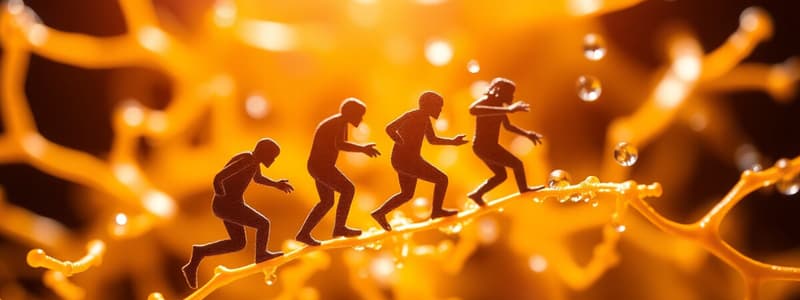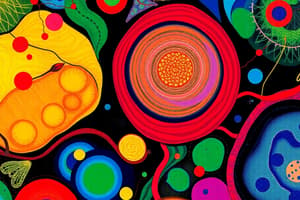Podcast
Questions and Answers
What is adaptation in an organism?
What is adaptation in an organism?
- Changes in traits that decrease survival chances
- Changes in traits that only affect reproduction
- Changes in traits that have no effect on survival
- Changes in traits that improve survival and reproduction (correct)
Which body system is primarily responsible for gas exchange in humans?
Which body system is primarily responsible for gas exchange in humans?
- Circulatory system
- Respiratory system (correct)
- Digestive system
- Musculoskeletal system
What does cell theory state?
What does cell theory state?
- Cells can arise from non-living matter
- Cells perform all bodily functions independently
- Cells are the basic units of life (correct)
- All living organisms are unicellular
What does the germ theory of disease propose?
What does the germ theory of disease propose?
What is speciation?
What is speciation?
What is the primary focus of botany?
What is the primary focus of botany?
Which level of biological organization encompasses groups of different populations?
Which level of biological organization encompasses groups of different populations?
What is a key mechanism of evolution?
What is a key mechanism of evolution?
Which type of cell lacks membrane-bound organelles?
Which type of cell lacks membrane-bound organelles?
What defines a biome?
What defines a biome?
In genetics, what is the observable traits of an organism known as?
In genetics, what is the observable traits of an organism known as?
What is homeostasis?
What is homeostasis?
Which term describes a relationship where one organism benefits at the expense of another?
Which term describes a relationship where one organism benefits at the expense of another?
Study Notes
Overview of Biology
- Definition: Biology is the study of living organisms, their structure, function, growth, origin, evolution, and distribution.
- Branches:
- Botany: Study of plants.
- Zoology: Study of animals.
- Microbiology: Study of microorganisms.
- Ecology: Study of interactions between organisms and their environment.
- Genetics: Study of heredity and variation.
- Cell Biology: Study of cell structure and function.
Basic Concepts
-
Cell Theory:
- All living organisms are composed of cells.
- The cell is the basic unit of life.
- All cells arise from pre-existing cells.
-
Evolution:
- Change in the heritable characteristics of biological populations over successive generations.
- Natural selection is a key mechanism of evolution.
-
Homeostasis:
- The ability of an organism to maintain a stable internal environment despite changes in external conditions.
Levels of Biological Organization
- Molecules: Basic chemical units.
- Cells: Smallest unit of life.
- Tissues: Groups of similar cells performing a specific function.
- Organs: Structures made up of different tissue types.
- Organ Systems: Groups of organs working together.
- Organisms: Individual living entities.
- Populations: Groups of organisms of the same species.
- Communities: Different populations living together.
- Ecosystems: Communities plus their physical environment.
- Biosphere: Global ecological system.
Cellular Structure
-
Prokaryotic Cells:
- No membrane-bound organelles.
- Includes bacteria and archaea.
-
Eukaryotic Cells:
- Membrane-bound organelles (e.g., nucleus, mitochondria).
- Includes plants, animals, fungi, and protists.
Genetics
- DNA: Deoxyribonucleic acid; the molecule that carries genetic information.
- Genes: Segments of DNA that code for proteins.
- Alleles: Different versions of a gene.
- Genotype vs. Phenotype:
- Genotype: Genetic makeup of an organism.
- Phenotype: Observable traits of an organism.
Ecology and Environment
- Biomes: Large ecosystems characterized by specific climate conditions and plant/animal communities (e.g., deserts, forests, grasslands).
- Food Chain: Hierarchical system showing who eats whom in an ecosystem.
- Symbiosis: Interaction between different organisms:
- Mutualism: Both benefit.
- Commensalism: One benefits, other is unaffected.
- Parasitism: One benefits at the expense of the other.
Evolutionary Concepts
- Adaptation: Changes in traits that improve an organism's chances of survival and reproduction.
- Speciation: The formation of new and distinct species in the course of evolution.
Human Biology
- Body Systems: Include digestive, respiratory, circulatory, nervous, musculoskeletal, immune, and reproductive systems.
- Homeostasis in Humans: Regulated through feedback mechanisms involving hormones and nervous system responses.
Important Theories
- Cell Theory
- Theory of Evolution by Natural Selection
- Germ Theory of Disease: The theory that certain diseases are caused by the invasion of the body by microorganisms.
Conclusion
Biology encompasses a wide range of topics that explain the complexities of living systems and their interactions. Understanding these fundamental concepts is essential for further studies in the biological sciences.
Definition of Biology
- Biology studies living organisms, their structures, functions, growth, origins, evolution, and distribution
Branches of Biology
- Botany: Study of plants
- Zoology: Study of animals
- Microbiology: Study of microorganisms
- Ecology: Study of the relationships between organisms and their environment
- Genetics: Study of heredity and variation
- Cell Biology: Study of cell structure and function
Basic Concepts
- Cell Theory:
- All living organisms are made up of cells.
- Cells are the basic unit of life.
- All cells come from pre-existing cells.
- Evolution:
- Changes in the characteristics of biological populations over time.
- Natural selection is a key process in evolution.
- Homeostasis:
- The ability of an organism to maintain a stable internal environment, even when external conditions change.
Levels of Biological Organization
- Molecules: Basic chemical units of life
- Cells: Smallest unit of life
- Tissues: Groups of similar cells performing a specific function
- Organs: Structures made up of different tissue types
- Organ Systems: Groups of organs working together
- Organisms: Individual living entities
- Populations: Groups of organisms of the same species
- Communities: Different populations living together
- Ecosystems: Communities plus their physical environment
- Biosphere: The global ecological system
Cellular Structure
- Prokaryotic Cells:
- These cells lack membrane-bound organelles.
- Prokaryotes include bacteria and archaea.
- Eukaryotic Cells:
- These cells have membrane-bound organelles, including the nucleus and mitochondria.
- Eukaryotes include plants, animals, fungi, and protists.
Genetics
- DNA: Deoxyribonucleic acid, the molecule that carries genetic information
- Genes: Segments of DNA that code for proteins
- Alleles: Different versions of a gene
- Genotype vs. Phenotype:
- Genotype: The genetic makeup of an organism
- Phenotype: Observable traits of an organism
Ecology and Environment
- Biomes: These are large ecosystems characterized by specific climate conditions and plant/animal communities, like deserts, forests, and grasslands.
- Food Chain: A hierarchical system showing who eats whom in an ecosystem
- Symbiosis: Interactions between different organisms:
- Mutualism: Both benefit.
- Commensalism: One benefits, the other is unaffected.
- Parasitism: One benefits at the expense of the other.
Evolutionary Concepts
- Adaptation: Changes in traits that improve an organism's chances of survival and reproduction.
- Speciation: The formation of new and distinct species in the course of evolution.
Human Biology
- Body Systems: Include digestive, respiratory, circulatory, nervous, musculoskeletal, immune, and reproductive systems.
- Homeostasis in Humans: Regulated through feedback mechanisms involving hormones and nervous system responses.
Important Theories
- Cell Theory
- Theory of Evolution by Natural Selection
- Germ Theory of Disease: The theory that certain diseases are caused by the invasion of the body by microorganisms.
Conclusion
- Biology is a vast field of study explaining the complexities of living systems and their interactions.
- Understanding these fundamental concepts is essential for further studies in the biological sciences.
Studying That Suits You
Use AI to generate personalized quizzes and flashcards to suit your learning preferences.
Description
Explore the fundamental principles of biology, including its branches such as botany, zoology, and microbiology. This quiz covers essential concepts like cell theory, evolution, and homeostasis. Test your understanding of how living organisms function and interact with their environment.




